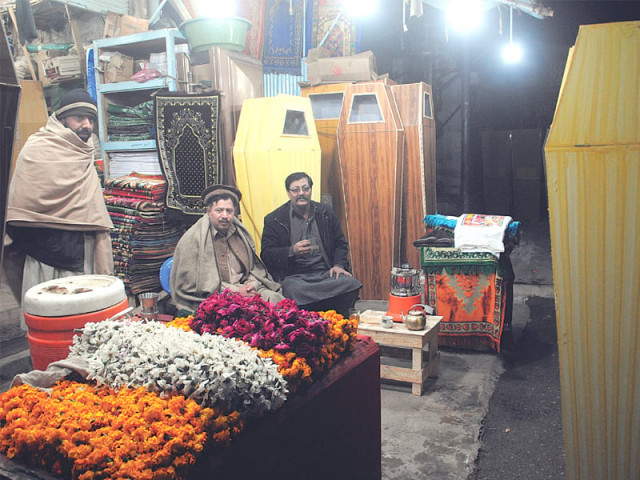The grateful dead
Only a city like Peshawar would need a 24-hour coffin maker and man with the stomach to do the job .

Life is stranger than fiction in the snarled streets of Peshawar’s walled city. Past midnight, I walk into one alleyway that brightens up from the sound of a muffled ditty. It is coming from a television somewhere in the bowels of a shop. Inside the establishment, a Shakespearean funerary scene unfolds. Its proprietor, Abdul Latif, sits hunched over a gas stove, waiting for some green tea to reach its full flavour. He is surrounded by honeycomb coffins.
“My wife tells me she won’t pray for my business to prosper,” he says wryly. But given Peshawar’s human sacrifices to extremism, she would hardly need to. His business of making coffins runs into the millions of rupees. He started it 27 years ago after getting married upon his return to Pakistan from the Middle East where he worked as a labourer. “Someone stole my herd of cows. I was left with nothing so I started this business.”
The ‘specialty’ of Latif & Sons is not that it claims to be the only such store open 24 hours in a city which has suffered so much death that its residents now mark their past by the body count — but that the shop has never closed once since it opened. The fact of the matter is that Latif & Sons not only serves the general public but also has a contract with the armed forces in Khyber-Pakhtunkhwa. That necessitates a 24-hour service.
“Death is the business and it’s booming,” he remarks, estimating a 200 per cent growth in the last two years. Terrorists have killed 803 people in this city alone in 2011. The figure is much higher if the surrounding region is included.
Latif trails off, his gaze fixated on his fuzzy reflection in the brassy bulge of the kettle. He is a terse, cryptic man and his sentences are difficult to decipher, something I put down to the nature of his profession. Mercifully though, the silence is broken by one of his friends, a middle-aged Riaz Ahmad who pops in regularly for a chat. “Usually people walk past the shop — they do not want to bother looking into it,” he explains. “Our only friends are the policemen, who’ve made it their nocturnal abode, calling it ‘Latif Chowki’.”
As the green tea cools, the clock’s hands inch closer to 2am. Latif emerges from his reverie to recall one of the worst days. A bomb ripped through Meena Bazaar, a few paces from the shop, killing 137 men, women and children. “We earned a lot that day. We provided over a hundred coffins,” he says. “My heart wept but I had to do what I had to do.” Learning from that lesson, he keeps a stock of three hundred coffins at any given time.
But coffins are a recent phenomenon, as Muslims keep their burials limited to a shroud. Latif explains why the trend changed; bodies were arriving mutilated.
The process of making a coffin takes a day or two. Latif employs three carpenters who work in shifts. The prices range from Rs1,800 to Rs32,000. “There are people who cannot afford it sometimes so we give them away for free,” he adds.
The most expensive ones are made of lamination sheet and poplar wood. A simpler 22,000-rupee one uses check board and poplar wood and the most basic coffin is just put together with wooden planks. For larger bodies they build them seven feet long and three feet wide, otherwise the standard size is 6.5 feet by 2.5 feet. “We also make caskets for children for Rs500 to Rs1,100,” Latif says. These customers are usually the Sikhs who prefer to put the child in a cradle and release it in the Budhni stream on the outskirts of the city.
The men fall silent again. Sip their tea. I look around the shop and something silver and shiny catches my eye between the planks of wood. “That’s Dracula’s casket,” Latif explains. Someone brought a body from England and gifted the casket to him. “We now rent it out to private productions.” Life’s little ironies are not lost on him.
Published in The Express Tribune, Sunday Magazine, May 5th, 2013.
Like Express Tribune Magazine on Facebook to stay informed and join the conversation.



















COMMENTS
Comments are moderated and generally will be posted if they are on-topic and not abusive.
For more information, please see our Comments FAQ